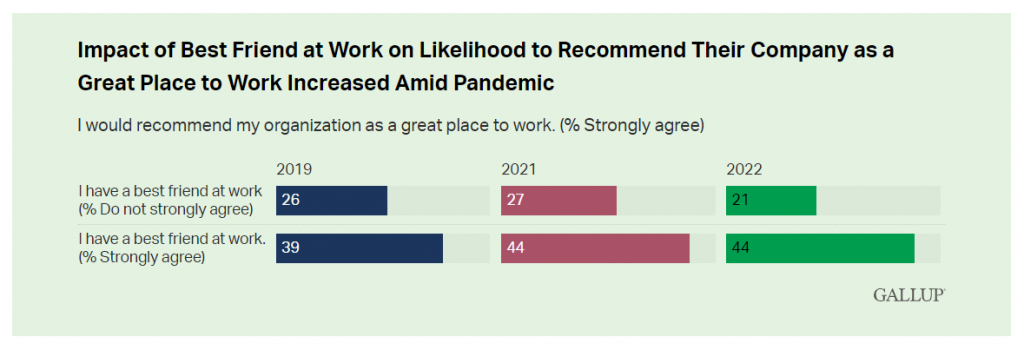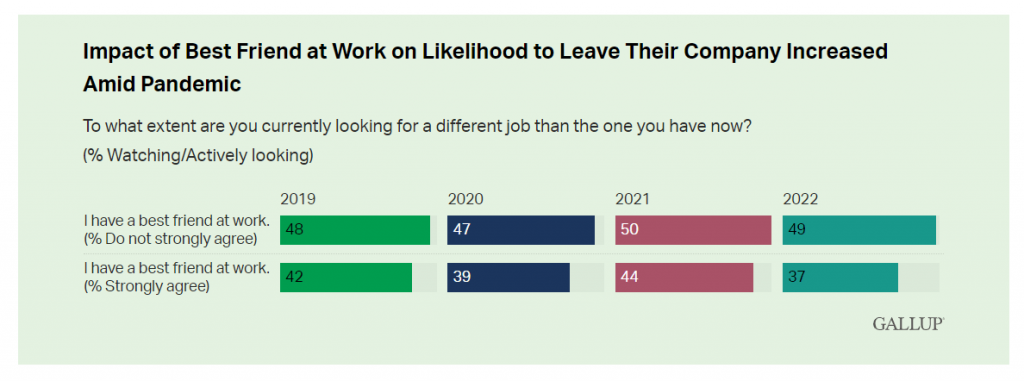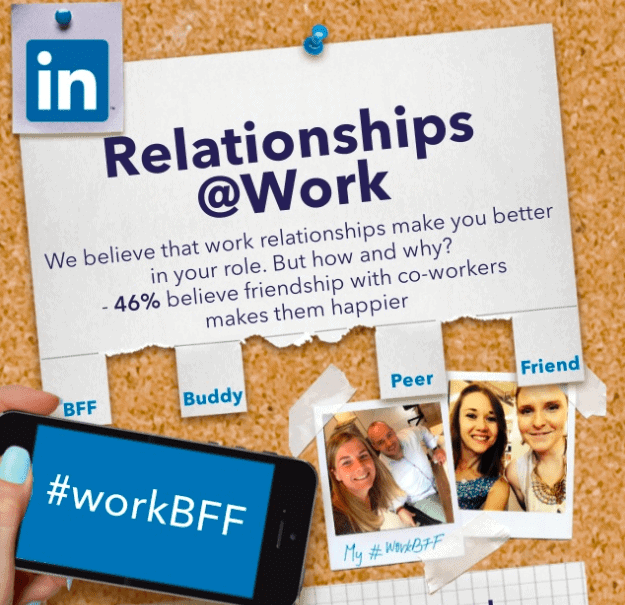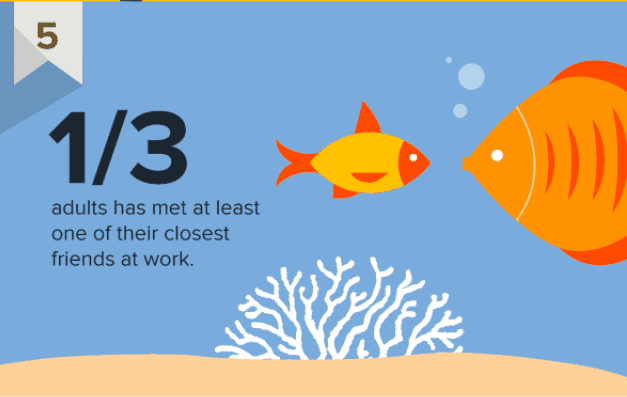Do you have a best friend at work? Have you ever had a work BFF?
If you've been lucky enough to have one, you know what a difference it can make. For a variety of reasons, it can make all the usual politics, challenges, and day to day ups and downs easier to navigate and thrive in.
It can also deepen a friendship as you get the chance to do what you're best at with someone you enjoy spending time with.

Gallup Uncovers the Value of a Best Friend at Work
We're big fans of Gallup's research into the workplace. Few have access to as many workers (typical studies include upwards of millions) or been doing it for as long (decades).
One of the most important keys to engagement and happiness at work according to Gallup is having a work bestie:
"Our research has repeatedly shown a concrete link between having a best friend at work and the amount of effort employees expend in their job.
For example, women who strongly agree they have a best friend at work are more than twice as likely to be engaged (63%) compared with the women who say otherwise (29%)."
Gallup has also found that having a best friend at work has become even more important to employees since COVID.
The support and accountability a best friend provides have helped many employees navigate the new challenges of remote work and increased stress during new economic challenges post COVID. Here are some of Gallup’s main findings on this showing the growing disparity between those with a work best friend and those without one now:



While the differences vary depending on which question was asked, you can see that across the board, if you have a work best friend, you are more satisfied at work, less likely to quit, and much more likely to recommend your company to others.
Gallup also found a strong link to overall engagement activities:
"Those who [have a work best friend] are seven times as likely to be engaged in their jobs, are better at engaging customers, produce higher quality work, have higher well-being, and are less likely to get injured on the job.
Further, specifically for women in the workplace, Gallup found that women who strongly agree they have a best friend at work feel:
- less likely to be actively looking or watching for job opportunities
- more connected with their coworkers, knowing what is expected of them and trusting their integrity and ethics
- more likely to have a positive experience during the day, such as enjoying what they do, making more progress and getting recognized for successes
- less likely to report having a negative experience during the day such as worry, stress and feeling tired
Who wouldn't want their staff to feel those things?

Gallup is in good company.
Not surprisingly, others studying workplace engagement and happiness had similar findings to Gallup.
Linkedin found a variety of benefits to having a work bestie:
- Especially for your youngest staff (age 18-24), it improves their happiness, motivation, and productivity.
- 1/3rd of Millennials believe that socializing and friendships are important to moving up the career ladder.
- 51% of workers stay in touch with their former colleagues, which can lead to boomerang employees, or in bad environments more turnover.
OffieVibe also found interesting data, including the fact that 1/3rd of Americans have met a best friend at work.

Of course, some haven't been as big a fan of having a best friend at work as a key indicator. Maybe they've never experienced it themselves, feeding their skepticism. Unfortunately, having a best friend at work isn't as common as it should be: Gallup estimates only 2 in 10 workers have a work BFF today.
Maybe you're in the skeptics group, too, or wondering how something like that can have such direct benefits to the workplace.
Today, we take a look at why having a work best friend matters. Then, we'll dig into a few ways you can work on having a work BFF yourself or for your team members.
Table of Contents:
- Why Having a Best Friend at Work Matters
- How to Find a Best Friend at Work
- How to have more of Your Team have Work Besties

Why Having a Best Friend at Work Matters
Quantitative data can tell you something is important, but it's the anecdotal qualitative information that helps you understand the meaning behind numbers.
Now that we know the statistics behind the value of a best friend at work, let's explore why having a work BFF matters.

1) A best friend at work gives you someone to look forward to seeing
"I have looked in the mirror every morning and asked myself: "If today were the last day of my life, would I want to do what I am about to do today?" And whenever the answer has been "No" for too many days in a row, I know I need to change something.” - Steve Jobs, co-founder of Apple
As Jobs describes, if you don't like getting up in the morning for work for too long, it's time to make a change. While the ideal is obviously you love your work no matter your peers, we know that's not how it works. Having a friend you're excited to get to work to see can be a key part of enjoying your job.
Having someone you look forward to seeing can make it easier to get through a tough project, challenging time at your company, or just be excited to get to the office a little earlier.
Work best friends in Silicon Valley
One of the interesting parts about working in startups, especially in Silicon Valley, are the friendships that form between founders and employees alike. When you spend so much time working together, it's not surprising that strong bonds can form.
I've had friends in the Valley who have met their spouses at work, as well as made the majority of their friends they spend time with on the job. In one case, I was at a friend's birthday and out of about 20 people, I was the only one not working at his company!
Whether or not it's totally healthy to go so far as to have all your friends at your place of work, having some work besties can be a huge boost. The more reasons to look forward to coming into the office each day, the better your job and morning routine will feel for you.

2) A work BFF gives you someone to talk with and who will listen
Having a best friend at work can be very cathartic. Many times, we just want to feel heard and no one listens as well as a friend.
In particular, at work there are moments that only a coworker can understand and only a friend will celebrate or sympathize with you:
- Get a big win, or finish a big task? Your work BFF will be there to high five or share the perfect celebratory gif.
- Struggling with a colleague or boss? Your work BFF will listen and empathize.
While any friend can listen and celebrate with you, only a coworker understands context. This shared understanding helps in a million little ways every day as you navigate your workplace.
The dark side of a work best friend
While having a work bestie can be healthy and boost your morale, if there are many problems on your team or at your company, it can backfire. When a company is dysfunctional, it's easy to slip into gripe sessions with them.
Thinking back to very early in my career, I had a job where I had a work BFF in this kind of situation. Unfortunately, things weren't going well at the company, and our conversations reflected it. It was a little too easy to share eye rolls or complain.
At that point, it was no longer nearly as beneficial to have a best friend at work.
This is why as a lesson for leaders, you have to realize that your team having a best friend at work is a double-edged sword; when things are good, it can boost morale, increase productivity, and help you retain good people. However, if you have a toxic culture, it can lead to bad habits, unhealthy conversation, and multiple employees quitting at the same time.

3) A work best friend can help you check yourself
A lot of ideas can seem great in your head, but in reality be very poor. Other times, context you don't know about can change everything.
These are the kinds of situations where having a work bestie can make all the difference.
While any co-worker can give you feedback, your best friend at work is most likely to help you catch yourself before making a mistake. Most importantly, if they're a best friend, you're also much more likely to listen to them.
Feedback from your boss or an adversary can sometimes feel politically motivated, but when it's your friend it carries meaning. You know they want the best for you.
A Story: Helping friend at work with their body language.
I was talking about this concept with a friend a few months ago and they shared a story with me I want to retell here.
They were working remotely, with much of the meeting happening together in a conference room. Their friend was in the room with much of the executive team. Unfortunately, they had terrible body language.
Being a proverbial fly on the wall, my friend was able to see their work BFF clearly looking closed off and uncomfortable.
To help them out, my friend messaged their BFF. They first ask if they were feeling okay, then let them know how they looked.
Best of all, when their BFF relaxed and opened up their body language, my friend could observe how it changed the meeting dynamic. Suddenly, they were more engaged, and others in the meeting brought them more fully into the discussion, too.
Their work BFF would have never recognized this on their own, and a regular coworker would have never said anything.
This is just one example of how a work best friend can help in a million small ways to make work better for you.

How to Find a Best Friend at Work
If you're reading this and have a work bestie, take a minute to be grateful. Only 1 in 5 people have one.
For the rest of us, here are a few tactics you can use to try to find and grow a great friendship at work.
Focus on rapport
According to BetterUp’s report on the state of workplace relationships, almost 50% of people don’t feel any sense of connection to their teammates. Are you one of them?
It might be hard to believe, but you probably have more in common with your coworkers than you think. While you might come from different backgrounds or belong to different generations, there are always some common shared interests to be found.
You can build rapport and connection with your coworkers by asking a bit about them (we have over 100 different topics for you to try here) such as hobbies, sports, entertainment, or, when in doubt, something as simple as – food.
Also, consider observing what’s on and around their desk, or in view of their camera if you’re remote. Usually, things are intentionally in those areas and they’d love to talk about them. And if you have a similar interest (like say a favorite book, artist, or sport), you’ve just built a new connection!
Take advantage of easy social situations
BetterUp’s report also states that 69% of employees aren’t satisfied with the opportunities for connection at that workplace.
And that certainly rings true – especially with the recent rise of remote work. Collaboration, communication, and loneliness have become some of the leading struggles for remote workers.
To overcome the challenge remote work poses to workplace bonding, you might need to get creative: schedule virtual coffee with your colleagues, have a peer 1 on 1, or try your hand at remote-friendly games. You can also use the time when a meeting hasn’t started yet to make some small talk about kids, pets, or other similar topics.
For those who are now back in-office full-time: work happy hours, inviting someone along for lunch, and community service events, are all great opportunities to build a relationship beyond TPS report covers.
Take your time
Building any friendship takes time. A study by the University of Kansas, for example, found that on average it takes 80 to 100 hours to form a real bond with a new friend. In a goal-oriented office environment, where opportunities to bond are scarce, it might take even longer. And be aware you won't click with everyone – so don’t put too much pressure on yourself when it comes to making connections.
Instead, focus on having fun and use that as an easy way to get to know your coworkers – even if they might not become your work besties.
—
Of course, you can shortcut all of this. When your company is hiring, refer a friend you'd love to work with.
Then, you'll have a work BFF from the day they start. However, be prepared for the relationship to change.
Things that are okay outside of work are not always okay in them. And if one of you leaves the company, it could change how your friendship is going forward. (If you want to read up a bit more on this, we wrote more about the issue of manager-employee friendships in one of our Ask Lighthouse columns.)

How to have more of Your Team have Work Best Friends
Given so few employees have a best friend at work, it can be beneficial to think about how you can help your team members have more friends at work.
Of course, this means you have the basics of good management already covered. Otherwise, go and first watch and learn about the 3 keys to motivating and retaining your team.
Once you have a healthy culture and engaged team, then you're ready to try some of these tactics to help more of your team have a best friend at work, too.
Organize social events
As a team lead, regular organization and hosting of social events might already be expected of you in some companies.
If this is something you want to introduce to your team for the first time, it’s best to start with something low commitment, like taking everybody to lunch or after-work drinks. Sharing a meal together is a perfect way to connect in a relaxed setting.
Another fun idea is to plan a half-day excursion to something interesting. Consider options like an art museum, bowling alley, escape room, concert, or sports game – places where you can unwind and have fun!
The key is to understand your team and choose something they will enjoy; if none of your team likes sports, then a baseball game is probably a bad idea no matter how much you love it. If you’re unsure what they’ll like, then ask! This is why we encourage managers to build rapport with everyone they manage.
If you're seeking a more active and definitely positive experience, consider volunteer projects. Find a local cause you're passionate about and sign up to volunteer together. Giving back is incredibly rewarding, and the positive energy of helping others will now be associated with your team and their peers.
Don’t force friendships
While these events sound great, and we want to try to encourage friendships to form, be aware: some of your team members might be reluctant to join, or will choose to skip out – and that's okay.
Creating high-pressure situations for your coworkers to connect and have fun invariably has the opposite result; they’ll be no closer to being friends, and they’ll resent you.
Don’t flat out say the goal is to have people become friends; just plan a fun event and let things emerge organically. By choosing something your team will like, and resisting the desire to put pressure on anyone to become friends with anyone else, you’ll create the best environment for it to naturally happen.
Be intentional, especially remotely
As we previously mentioned, working remotely adds several more difficulties to making friends at work. However, just because you aren't face-to-face doesn't mean you can't have meaningful interactions with your coworkers!
As a manager of a remote team, you need to be really intentional by trying games and other team building activities that get people talking about more than projects. Here are some ideas that you could use:
- Video coffee chats — mimic those classic in-office coffee breaks by chatting over video 1:1 or in small groups. Ask fun questions and see where the conversation goes. Making time for small talk in meetings can also help people learn more about each other and start building connections. Google’s executive coach Bill Campbell famously did this even in the C-level meetings there.
- Remote games — just because you’re not face to face doesn’t mean you can’t have fun together. You can try playing video games together like Jackbox or Among Us. If you like the old school games, you can also try things like group trivia, Charades, or Pictionary over video chat. Laughter and fun competition unite!li
- Netflix / Movie viewing party – choose a show or movie to watch together. Provide commentary and reactions over text or video to feel like you're on the couch together. This can work great for shows about your industry (think Silicon Valley, Scrubs, or Billions), or movies with unique ties to your company brand (like if your company mascot is tied to a movie).
- Book club – pick a business or personal growth book to read, then have a virtual discussion about it as you progress through it. You'll get new perspectives on concepts, plus new topics to talk about together. Let your team have input on this, so it’s something they’re invested in reading.
- Lighthouse Lessons - Don’t want to have chapter assignments, and wish you had all the prep for a discussion ready for you? Our light-weight training programs are like a book club, but better: one, highly actionable, insightful 15-minute lesson per week and a discussion guide for you to lead a conversation about it. They’ll get your team to share challenges and support each other with the minimum commitment.
Encourage referrals
Help more of your team have a friend at work by asking them to refer high quality friends, just like we suggested you do for yourself in the previous section.
Not only does hiring employee referrals do wonders for office morale and culture, it also comes with a host of other benefits, including:
- 45% of referral hires stay with the company for longer than 4 years.
- Cost-per-hire of employee referrals is $1,000 less on average than other hiring sources.
- Hiring referrals reduces company turnover by up to 20%.
No matter how it happens, having a best friend at work is a great way to make work a little more fun and enjoyable. It's an easy way to boost morale on your team and help a good team become great.

What is a best friend at work?
A best friend at work is someone you feel a special connection to. You feel accountable to your best work friend and don’t want to let them down. You are most likely to go the extra mile on a project for them, and vice versa.
A best friend at work can also take the burden off you when workloads are overwhelming you. They can make daily work challenges, and day-to-day ups and downs easier to navigate and thrive in as they support you and care about your well being in ways others may not.
Why do coworkers make the best friends?
According to a study by Gallup, there is a clear link between having a best friend at work and the amount of effort employees put into their job. For example, women who strongly agree they have a best friend at work are more than twice as likely to be engaged (63%) compared to the women who say otherwise (29%).
Having a coworker as a best friend can deepen friendships outside of work as you get the chance to do what you’re best at with someone you enjoy spending time with.
Can co workers be best friends?
Yes. And even better, they can have a huge, positive impact as studies by Gallup, Linkedin and others show it leads to less turnover, higher engagement, lower stress, and many other benefits.
A work best friend can help you feel more connected to your workplace, and offer you support when you need it.
Learn more about why work besties matter and how you and your team can build these friendships here.




